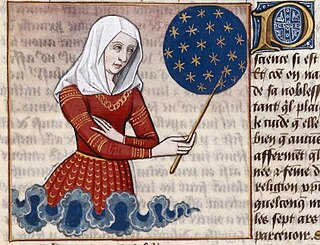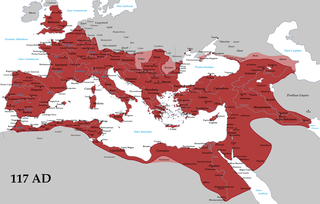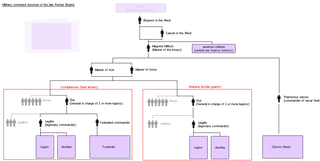
Acts of the Apostles, often referred to simply as Acts, or formally the Book of Acts, is the fifth book of the New Testament; it tells of the founding of the Christian church and the spread of its message to the Roman Empire.

Pope Stephen I was the Bishop of Rome from 12 May 254 to his death in 257. Of Roman birth but of Greek ancestry, he became bishop after serving as archdeacon of Pope Lucius I, who appointed Stephen his successor.

Pavia is a town and comune of south-western Lombardy in northern Italy, 35 kilometres south of Milan on the lower Ticino river near its confluence with the Po. It has a population of c. 73,000. The city was the capital of the Kingdom of the Lombards from 572 to 774.

The ascension of Jesus is the departure of Christ from Earth into the presence of God. The biblical narrative in Chapter 1 of the Acts of the Apostles takes place 40 days after the resurrection: Jesus is taken up from the disciples in their sight, a cloud hides him from view, and two men in white appear to tell them that he will return "in the same way you have seen him go into heaven." In the Christian tradition, reflected in the major Christian creeds and confessional statements, the ascension is connected with the exaltation of Jesus, meaning that through his ascension, Jesus took his seat at the right hand of God: "He ascended into heaven, and is seated at the right hand of God the Father Almighty." In modern times the Ascension is seen less as the climax of the mystery of Christ than as "something of an embarrassment", in the words of McGill University's Douglas Farrow.
Priscillian was a wealthy nobleman of Roman Hispania who promoted a strict form of Christian asceticism. He became bishop of Ávila in 380. Certain practices of his followers were denounced at the Council of Zaragoza in 380. Tensions between Priscillian and bishops opposed to his views continued, as well as political maneuvering by both sides. Around 385, Priscillian was charged with sorcery and executed by authority of the Emperor Maximus. The ascetic movement Priscillianism is named after him, and continued in Hispania and Gaul until the late 6th century. Tractates by Priscillian and close followers, which had seemed lost, were discovered in 1885 and published in 1889.
Donatism was a schism in the Church of Carthage from the fourth to the sixth centuries AD. Donatists argued that Christian clergy must be faultless for their ministry to be effective and their prayers and sacraments to be valid. Donatism had its roots in the long-established Christian community of the Roman Africa province in the persecutions of Christians under Diocletian. Named after the Berber Christian bishop Donatus Magnus, Donatism flourished during the fourth and fifth centuries.

Early Christianity covers the period from its origins until the First Council of Nicaea (325). This period is typically divided into the Apostolic Age and the Ante-Nicene Period.

During the reign of the Roman Emperor Constantine the Great (AD 306–337), Christianity began to transition to the dominant religion of the Roman Empire. Historians remain uncertain about Constantine's reasons for favoring Christianity, and theologians and historians have often argued about which form of early Christianity he subscribed to. There is no consensus among scholars as to whether he adopted his mother Helena's Christianity in his youth, or, as claimed by Eusebius of Caesarea, encouraged her to convert to the faith he had adopted himself.

Faltonia Betitia Proba was a Latin Roman Christian poet, perhaps the earliest female Christian poet whose work survives. A member of one of the most influential aristocratic families, she composed the Cento Vergilianus de laudibus Christi, a cento composed with verses by Virgil re-ordered to form an epic poem centred on the life of Jesus.

Gustavo Testa was an Italian prelate of the Catholic Church, who was made a Cardinal in 1959. He spent his career in the Roman Curia. He entered the diplomatic service of the Holy See in 1920 and held several appointments as papal nuncio from 1934 to 1959. He headed the Congregation for Oriental Churches from 1962 to 1968.
Clodius Celsinus Adelphius or Adelfius was a politician of the Roman Empire.
Marcus Aurelius Valerius Tullianus Symmachus Phosphorius was a Consul of the Roman Empire in 330. He had been proconsul of Achaea in 319.
Lucius Aurelius Avianius Symmachus signo Phosphorius was an aristocrat of the Roman Empire, and father of Quintus Aurelius Symmachus.
Petronius Probianus was a politician of the Roman Empire.

With the Edict of Thessalonica in 380 AD, Emperor Theodosius I made Nicene Christianity the Empire's state religion. The Eastern Orthodox Church, Oriental Orthodoxy, and the Catholic Church each stand in that continuity.
Aurelius Celsinus was a politician of the Roman Empire.

Church of Zion, Jerusalem, also known as the Church of the Apostles on Mount Zion, refers to the remains of a Roman-era church or synagogue on Mount Zion in Jerusalem that some historians speculate may have belonged to an early Jewish-Christian congregation.
A toilet god is a deity associated with latrines and toilets. Belief in toilet gods—a type of household deity—has been known from both modern and ancient cultures, ranging from Japan to ancient Rome. Such deities have been associated with health, well-being and fertility and have been propitiated in a wide variety of ways, including making offerings, invoking and appeasing them through prayers, meditating and carrying out ritual actions such as clearing one's throat before entering or even biting the latrine to transfer spiritual forces back to the gods.

The Church Fathers, Early Church Fathers, Christian Fathers, or Fathers of the Church were ancient and influential Christian theologians and writers. There is no definitive list. The era of these scholars who set the theological and scholarly foundations of Christianity largely ended by AD 700.

Henchir-El-Msaadine is a Roman era set of ruins near Tebourba(Ancient Thuburbo Minus) in modern Tunisia, North Africa. The site is outside of Tunis. The ruins are tentatively identified as the remains of Municipium Aurelium Antoninianum Furnitanorum also known as Furnos Minor, a city of Africa Proconsularis. Furnos Minus had the rank of a Municipium (city) of Africa Proconsularis and has been identified through Epigraphic remains















